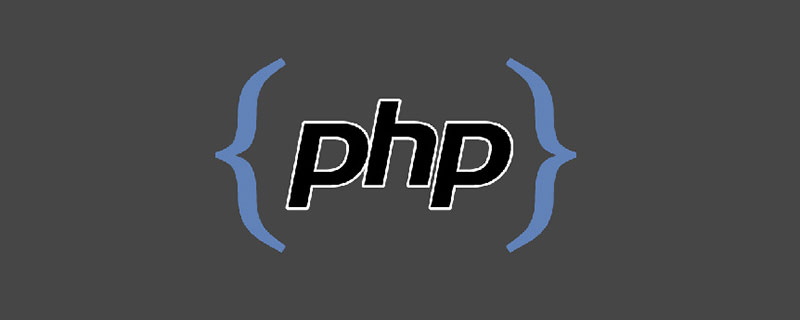Home >Backend Development >PHP Problem >How to use array_diff_ukey() function in PHP?
How to use array_diff_ukey() function in PHP?
- 醉折花枝作酒筹Original
- 2021-06-08 17:27:181840browse
This article will introduce to you how to use the "array_diff_ukey()" function in PHP. It has certain reference value. Friends in need can refer to it. I hope it will be helpful to everyone.

array_diff_ukey() function is a built-in function in PHP. It is used to compare two or more arrays of keys using a user-defined function and returns an array that is array1 and does not exist any other array2, array3 or more...
The syntax is as follows:
array_diff_ukey($array1, $array2, $array3..., arr_diffukeyFunction)
Using parameters: This function accepts a minimum of three parameters, while all three parameters are required and one is optional. The parameters are described as follows:
#$ array1 (mandatory): This array will be compared to other arrays (for example, this array is compared from array1).
$ array2 (mandatory): Array compared to the first array.
$ array3 (optional): Array compared to the first array.
arr_diffukeyFunction (mandatory): This is a required user-defined function. Defines a string on which comparison functions can be called. If the first argument is greater than the second argument, the comparison function returns an integer greater than 0.
Return value: Returns an array containing entries in array1 that do not exist in other arrays, for example: -(arra2, arra3, arar4….more). If all values exist in other arrays, the function returns NULL. The return value type is an array.
Example 1:
Input:
$arr1 = array("one"=>"C Program", "two"=>"PHP Program", "three"=>"Java Program ");
$arr2 = array("one"=>"Java Program", "two"=>"C++ Program", "six"=>"Java Program");
Output:
Array
(
[three] => Java Program
)
Explanation: First two values of arr1 are matched with arr2 and last value
not matched so the function returns last value.Example 2:
Input:
$arr1=array("one"=>"C Program", "two"=>"PHP Program", "three"=>"Java Program ");
$arr2=array("one"=>"Java Program", "two"=>"C++ Program", "three"=>"Java Program");
Output:
Array
(
)
Explanation: All values are matched with arr2 so function return null values.Let us take an example to understand the array_diff_ukey() function.
Program 1: Get two arrays (array1 and array2) and use the user-defined key comparison function (diffukeyFunction).
Simple solution in PHP language:
<?php
// Program of array_diff_ukey function in PHP
function arr_diffukeyFunction( $one , $two )
{
if ( $one === $two ) {
return 0;
}
return ( $one > $two ) ? 1 : -1;
}
// Driver Code
$arr1 = array (
"one" => "C Program" , "two" => "PHP Program" , "three" => "Java Program "
);
$arr2 = array (
"one" => "Java Program" , "two" => "C++ Program" , "six" => "Java Program"
);
$result = array_diff_ukey ( $arr1 , $arr2 , "arr_diffukeyFunction" );
print_r( $result );
?>The output is as follows:
Array
(
[three] => Java Program
)Program 2: Get three arrays (array1, array2 and arra3), and use user-defined Key comparison function (diffukeyFunction).
<?php
// Program of array_diff_ukey function in PHP
function arr_diffukeyFunction( $one , $two )
{
if ( $one === $two ) {
return 0;
}
return ( $one > $two ) ? 1 : -1;
}
// Driver Code
$arr1 = array (
"one" => "C Program" , "two" => "PHP Program" , "three" => "Java Program "
);
$arr2 = array (
"one" => "XML Program" , "two" => "C++ Program" , "four" => "CSS Program"
);
$arr3 = array (
"five" => "MVC Program" , "six" => "C# Program" , "one" => "ASP .NET Program"
);
$result = array_diff_ukey ( $arr1 , $arr2 , $arr3 , "arr_diffukeyFunction" );
print_r( $result );
?>The output is as follows:
Array
(
[three] => Java Program
)Program 3:
If all values match in other arrays, Null is returned
<?php
// Program of array_diff_ukey function in PHP
function arr_diffukeyFunction( $one , $two )
{
if ( $one === $two ) {
return 0;
}
return ( $one > $two ) ? 1 : -1;
}
// Driver Code
$arr1 = array (
"one" => "C Program" , "two" => "PHP Program"
);
$arr2 = array (
"one" => "Java Program" , "two" => "C++ Program"
);
$result = array_diff_ukey ( $arr1 , $arr2 , "arr_diffukeyFunction" );
print_r( $result );
?>The output is as follows:
Array ( )
Example 4:
If only one array (array1) is used, and a user-defined key comparison function (diffukeyFunction) is used, there is no output and a "RUNTIME ERROR" warning message is given.
<?php
//Program of array_diff_ukey function in PHP
function arr_diffukeyFunction( $one , $two )
{
if ( $one === $two ) {
return 0;
}
return ( $one > $two ) ? 1 : -1;
}
// Driver Code
$arr1 = array (
"one" => "C Program" , "two" => "PHP Program" , "three" => "Java Program "
);
//take only one array
$result = array_diff_ukey ( $arr1 , "arr_diffukeyFunction" );
print_r( $result );
?>The output is as follows:
No Output
Warning:
PHP Warning: array_diff_ukey(): at least 3 parameters are required, 2 given in /home/c0177af9f69e897ad93cc9855a9ae415.php on line 23
Recommended learning: php video tutorial
The above is the detailed content of How to use array_diff_ukey() function in PHP?. For more information, please follow other related articles on the PHP Chinese website!

